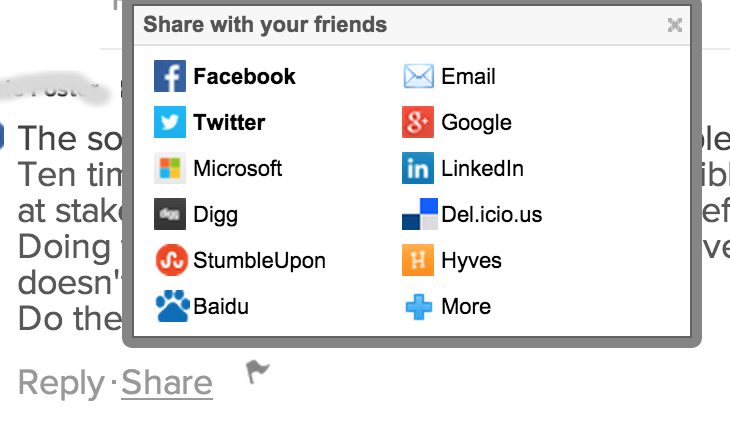
Source: getamity.com
“Best of Twitter” and other social-media reaction pieces continue to be popular among local-news providers. I think they’re fine — often amusing, occasionally enlightening — no real harm in doing them. I’ve dabbled (here and here).
But what about the great story reactions that occur within a newspaper’s own domain? That’s right, I’m talking about THE COMMENTS, a phrase that causes many journalists, and unfortunately the occasional digital communities manager, to roll their eyes and groan with disgust. Or worse, mock their readers. Descriptions I’ve heard journalists apply to commenters (also known as customers):
- “Morons”
- “Lunatics”
- “Nut jobs”
- “Racists”
Do readers sometimes spout ugly and hurtful words? Yes. Can they also provide valuable insight and context? Yes.
The last couple of years, it’s been trendy for engagement editors (or their marketing counterparts) to say, “Let’s not be limited to the site. We’ll go where the conversation is already happening! On social media!!” I think that’s a fine idea, but ignoring the comments section is not.
I’m proud to have worked at a company that early on decided to make engaging with readers in the comments not just a goal, but a job requirement. News sites that do this can be richly rewarded, in measurable terms (e.g. return visitors and time on site), and also in less measurable ways (increased credibility for journalists, greater rapport with customers, fodder for future stories). Not to get too marketing-speaky, but the comments are an opportunity to build a relationship with an audience, and newspapers are squandering it by hiding these sections, neglecting them or doing away with them altogether.
I’d love to see news sites make comments more visible on their article pages, not less so. Pull them up higher, give them some eye-catching graphical treatment. Not only could this add value to stories, but it would provide readers incentive to contribute more thoughtful remarks. And, frankly, showing a meaningful conversation between a reporter and a reader right there on the page would make the news organization look good.
My advice to community managers: Go forth into new territories, find and convert new readers there, but don’t abandon the customers who are already in your store.
 ‘Twas the first day of 2015, and all across the Internet, news organizations still had holiday-specific posts on their homepages.
‘Twas the first day of 2015, and all across the Internet, news organizations still had holiday-specific posts on their homepages.

Jan
Another Way To Engage With Readers Is Hiding In Plain Sight
Posted by Samantha Shaddock / Website Management
Source: getamity.com
“Best of Twitter” and other social-media reaction pieces continue to be popular among local-news providers. I think they’re fine — often amusing, occasionally enlightening — no real harm in doing them. I’ve dabbled (here and here).
But what about the great story reactions that occur within a newspaper’s own domain? That’s right, I’m talking about THE COMMENTS, a phrase that causes many journalists, and unfortunately the occasional digital communities manager, to roll their eyes and groan with disgust. Or worse, mock their readers. Descriptions I’ve heard journalists apply to commenters (also known as customers):
Do readers sometimes spout ugly and hurtful words? Yes. Can they also provide valuable insight and context? Yes.
The last couple of years, it’s been trendy for engagement editors (or their marketing counterparts) to say, “Let’s not be limited to the site. We’ll go where the conversation is already happening! On social media!!” I think that’s a fine idea, but ignoring the comments section is not.
I’m proud to have worked at a company that early on decided to make engaging with readers in the comments not just a goal, but a job requirement. News sites that do this can be richly rewarded, in measurable terms (e.g. return visitors and time on site), and also in less measurable ways (increased credibility for journalists, greater rapport with customers, fodder for future stories). Not to get too marketing-speaky, but the comments are an opportunity to build a relationship with an audience, and newspapers are squandering it by hiding these sections, neglecting them or doing away with them altogether.
I’d love to see news sites make comments more visible on their article pages, not less so. Pull them up higher, give them some eye-catching graphical treatment. Not only could this add value to stories, but it would provide readers incentive to contribute more thoughtful remarks. And, frankly, showing a meaningful conversation between a reporter and a reader right there on the page would make the news organization look good.
My advice to community managers: Go forth into new territories, find and convert new readers there, but don’t abandon the customers who are already in your store.